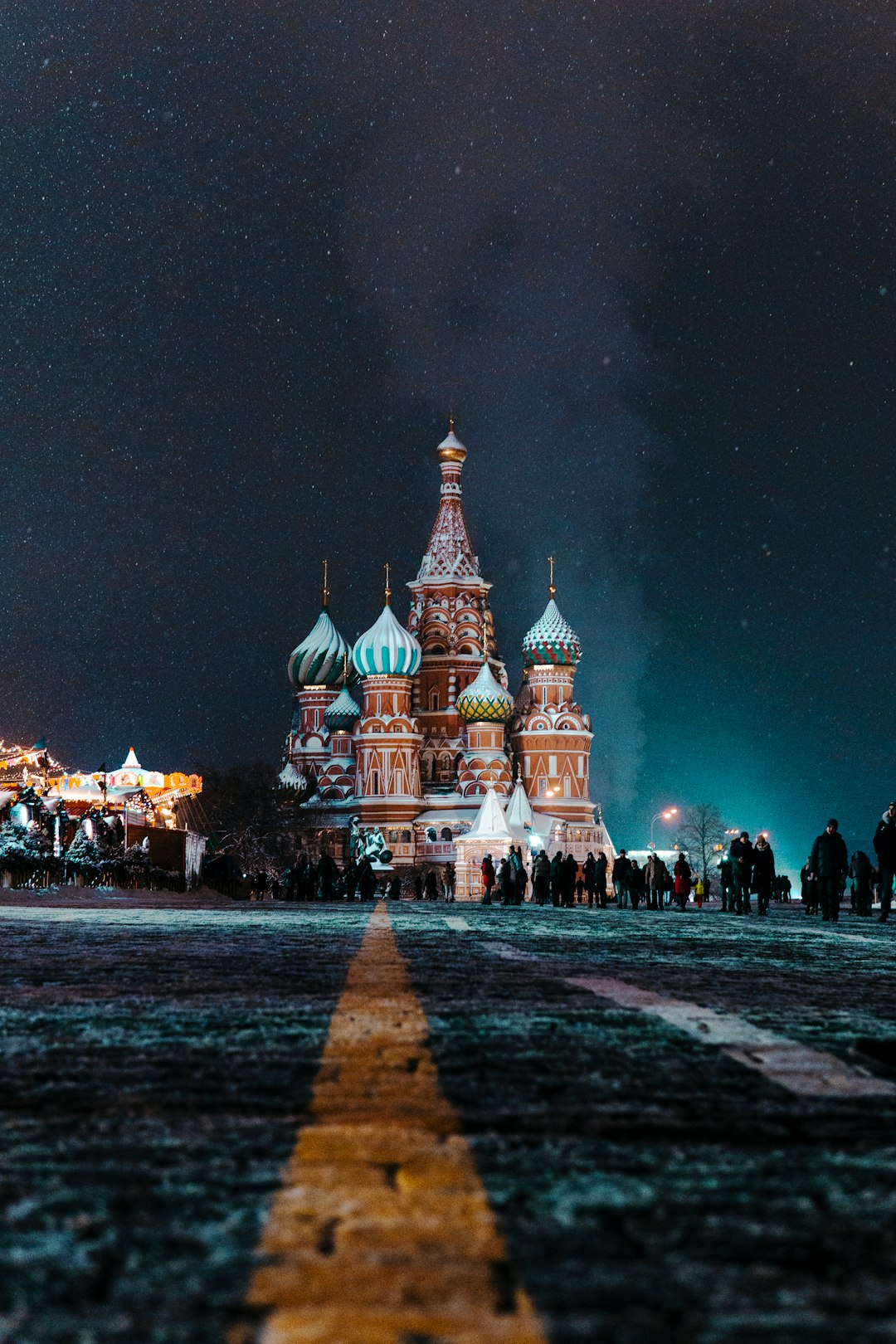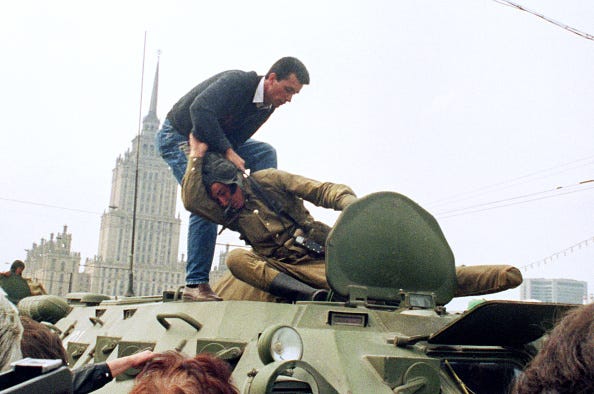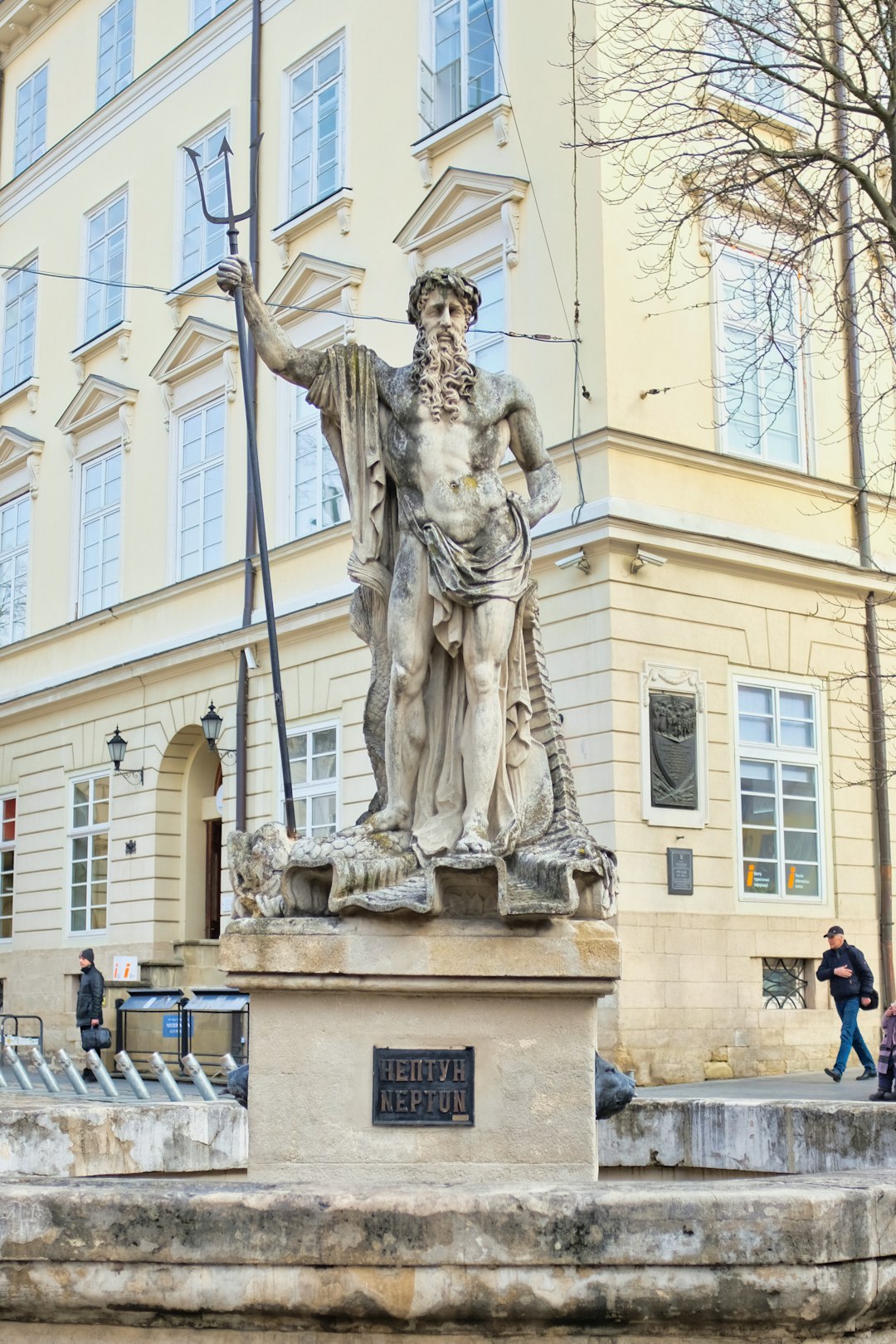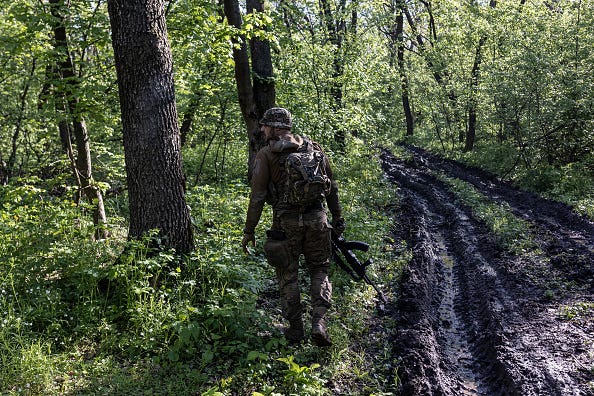How to understand Yevgeny Prigozhin's march on Moscow and its sudden end? Often there are plots without a coup; this seemed like a coup without a plot. Yet weird as the mercenary chief’s mutiny was, we can draw some conclusions from its course and from its conclusion.
1. Putin is not popular. All the opinion polling we have takes place in an environment where his power is seen as more or less inevitable and where answering the question he wrong way seems risky. But when his power was lifted, as when Rostov-on-Don was seized by Wagner, no one seemed to mind. Reacting to Prigozhin's mutiny, some Russians were euphoric, and most seemed apathetic. What was not to be seen was anyone in any Russian city spontaneously expressing their personal support for Putin, or let alone anyone taking any sort of personal risk on behalf of his regime. The euphoria suggests to me that some Russians are ready to be ruled by a different exploitative regime. The apathy indicates that most Russians at this point just take for granted that they will be ruled by the gangster with the most guns, and will just go on with their daily lives regardless of who that gangster happens to be.
2. Prigozhin was a threat to Putin, because he does much the same things that Putin does, and leverages Putin's own assets. Both the Russian state itself and Prigozhin's mercenary firm Wagner are extractive regimes with large public relations and military arms. The Putin regime exists, and the cities of Moscow and St. Petersburg are relatively wealthy, thanks to the colonial exploitation of hydrocarbon resources in Siberia. The wealth is held by a very few people, and the Russian population is treated to a regular spectacle of otherwise pointless war -- Ukraine, Syria, Ukraine again -- to distract attention from this basic state of affairs, and to convince them that there is some kind of external enemy that justifies it (hint: there really isn't). Wagner functioned as a kind of intensification of the Russian state, doing the dirtiest work beyond Russia, not only in Syria and Ukraine but also in Africa. It was subsidized by the Russian state, but made its real money by extracting mineral resources on its own, especially in Africa. Unlike most of its other ventures, Wagner's war in Ukraine was a losing proposition. Prigozhin leveraged the desperation of Russia's propaganda for a victory by taking credit for victory at Bakhmut. That minor city was completely destroyed and abandoned by the time Wagner took it, at the cost of tens of thousands of Russian lives. But because it was the only gain in Russia's horrifyingly costly but strategically senseless 2023 offensive, it had to be portrayed by Putin's media as some kind of Stalingrad or Berlin. Prigozhin was able to direct the false glory to himself even as he then withdrew Wagner from Ukraine. Meanwhile he criticized the military commanders of the Russian Federation in increasingly vulgar terms, thereby preventing the Russian state (and Putin) from gaining much from the bloody spectacle of invaded Ukraine. In sum: Wagner was able to make the Putin regime work for it.
3. Prigozhin told the truth about the war. This has to be treated as a kind of self-serving accident: Prigozhin is a flamboyant and skilled liar and propagandist. But his pose in the days before his march on Moscow made the truth helpful to him. He wanted to occupy this position in Russian public opinion: the man who fought loyally for Russia and won Russia's only meaningful victory in 2023, in the teeth of the incompetence of the regime and the senselessness of the war itself. I'm not sure enough attention has been paid to what Prigozhin said about Putin's motives for war: that it had nothing to do with NATO enlargement or Ukrainian aggression, and was simply a matter of wishing to dominate Ukraine, replace its regime with a Moscow-friendly politician (Viktor Medvedchuk), and then seize its resources and to satisfy the Russian elite. Given the way the Russian political system actually works, that has the ring of plausibility. Putin's various rationales are dramatically inconsistent with the way the Russian political system actually works.
4. Russia is far less secure than it was before invading Ukraine. This is a rather obvious point that many people aside from myself have been making, going all the way back the first invasion of 2014. There was never any reason to believe, from that point at the latest, that Putin cared about Russian national interests. If he had, he would never have begun a conflict that forced Russia to become subordinate to China, which is the only real threat on its borders. Any realist in Moscow concerned about the Russian state would seek to balance China and the West, rather than pursue a policy which had to alienate the West. Putin was concerned that Ukraine might serve as a model. Unlike Russians, Ukrainians could vote and enjoyed freedom of speech and association. That was no threat to Russia, but it was to Putin's own power. Putin certainly saw Ukraine as an opportunity to generate a spectacle that would distract from his own regime's intense corruption, and to consolidate his own reputation as a leader who could gather in what he falsely portrayed as "Russian" lands. But none of this has anything to do with the security of Russia as a state or the wellbeing of Russians as a people. The Putin of 2022 (much more than the Putin of 2014) seems to have believed his own propaganda, overestimating Russian power while dismissing the reality of the Ukrainian state and Ukrainian civil society -- something no realist would do. That meant that the second invasion failed, and that meant (as I wrote back in February 2022) that it would give an opportunity to a rival warlord. Prigozhin was that warlord and he took that opportunity. This might have all seemed abstract until he led his forces on a march to Moscow, downing six Russian helicopters and one plane, and stopping without ever having met meaningful resistance. To be sure, Wagner had many advantages, such as being seen as Russian by locals and knowing how local infrastructure worked. Nevertheless, Prigozhin's march shows that a small force would have little trouble reaching Moscow. That was not the case before most of the Russian armed forces were committed in Ukraine, where many of the best units essentially ceased to exist.
5. When backed into a corner, Putin saves himself. In the West, we have worry about Putin's feelings. What might he do if he feels threatened? Might he do something terrible to us? Putin encourages this line of thinking with constant bluster about "escalation" and the like. On Saturday Putin gave another speech full of threats, this time directed against Prigozhin and Wagner. Then he got into a plane and flew away to another city. And then he made a deal with Prigozhin. And then all legal charges against Prigozhin were dropped. And then Putin's propagandists explained that all of this was perfectly normal.
So long as Putin is in power, this is what he will do. He will threaten and hope that those threats will change the behaviour of his enemies. When that fails, he will change the story. His regime rests on propaganda, and in the end the spectacle generated by the military is there to serve the propaganda. Even when that spectacle is as humiliating as can be possibly be imagined, as it was on Saturday when Russian rebels marched on Moscow and Putin fled, his response will be to try to change he subject.
It is worth emphasizing that on Saturday the threat to him personally and to his regime was real. Both the risk and the humiliation were incomparably greater than anything that could happen in Ukraine. Compared to power in Russia, power in Ukraine is unimportant. After what we have just seen, no one should be arguing that Putin might be backed into a corner in Ukraine and take some terrible decision. He cannot be backed into a corner in Ukraine. He can only be backed into a corner in Russia. And now we know what he does when that happens: record a speech and run away.
(And most likely write a check. A note of speculation. No one yet knows what the deal between Putin and Prigozhin was. There are rumblings in Russia that Sergei Shoigu, Prigozhin's main target, will be forced to resign after accusations of some kind of corruption or another. There are reports that Prigozhin was given reason to be concerned about the lives of his own familymembers and those of other Wagner leaders. I imagine, personally, that one element was money. On 1 July, Wagner was going to cease to exist as a separate entity, at least formally speaking. It like all private armies was required to subordinate itself to the ministry of defense, which is to say to Shoigu. This helps to explain, I think, the timing of the mutiny. Were Wagner to cease to function as before, Prigozhin would have lost a lot of money. It is not unreasonable to suppose that he marched on Moscow at a moment when we still had the firepower to generate one last payout. Mafia metaphors can help here, not least because they are barely metaphors. You can think of the Russian state as a protection racket. No one is really safe, but everyone has to accept "protection" in the knowledge that this is less risky than rebellion. A protection racket is always vulnerable to another protection racket. In marching from Rostov-on-Don to Moscow, Prigozhin was breaking one protection racket and proposing another. On this logic, we can imagine Prigozhin's proposal to Putin as follows: I am deploying the greater force, and I am now demanding protection money from you. If you want to continue your own protection racket, pay me off before I reach Moscow.)
6. The top participants were fascists, and fascists can feud. We don't use the term “fascist” much, since the Russians (especially Russian fascists) use it for their enemies, which is confusing; and since it seems somehow politically incorrect to use it. And for another reason: unlike the Italians, the Romanians, and the Germans of the 1930s, the Putin regime has had the use of tremendous profits from hydrocarbons, which it has used to influence western public opinion. All the same, if Russia today is not a fascist regime, it is really difficult to know what regime would be fascist. It is more clearly fascist than Mussolini's Italy, which invented the term. Russian fascists have been in the forefront of both invasions on Ukraine, both on the battlefield and in propaganda. Putin himself has used fascist language at every turn, and has pursued the fascist goal of genocide in Ukraine.
Prigozhin has been however the more effective fascist propagandist during this war, strategically using symbols of violence (a sledgehammer) and images of death (cemeteries, actual corpses) to solidify his position. Wagner includes a very large number of openly fascist fighters. Wagner's conflict with Shogun has racist overtones, undertones, and throughtones -- on pro-Wagner Telegram channels he is referred to as "the Tuva degenerate" and similar.
That said, the difference between fascists can seem very meaningful when that is all that is on offer, and it is absolutely clear that many Russians were deeply affected by the clash of the two fascist camps. That said, it is important to specify a difference between Putin and Prigozhin's fascism and that of the 1930s. The two men are both very concerned with money, which the first generation of fascists in general were not. They are oligarchical fascists -- a breed worth watching here in the US as well.
7. The division in Russia was real, and will likely endure. Some Russians celebrated when Wagner shot down Russian helicopters, and others were astonished that they could do so. Some Russians wanted action, others could not imagine change. Most Russians probably do not care much, but those who do are not of the same opinion. Putin's regime will try to change the subject, as always, but now it lacks offensive power in Ukraine (without Wagner) and so the ability to create much of a spectacle. Russian propaganda has already turned against Wagner, who were of course yesterday's heroes. The leading Russian propagandist, Vladimir Solovyov, recruited for Wagner. The son of Putin's spokesman supposedly served in Wagner. Although this was almost certainly a lie, it reveals that Wagner was once the site of prestige.
It might prove hard for Russian propagandists to find any heroes in the story, since for the most part no one resisted Wagner's march on Moscow. If Wagner was so horrible, why did everyone just let it go forward? If the Russian ministry of defense is so effective, why did it do so little? If Putin is in charge, why did he run away, and leave even the negotiating to Lukashenko of Belarus? If Lukashenko is the hero of the story, what does that say about Putin?
It is also not clear what will happen now to Wagner. The Kremlin claims that its men will be integrated into the Russian armed forces, but it is hard to see why they would accept that. They are used to being treated with greater respect (and getting paid better). If Wagner remains intact in some form, it is hard to see how it could be trusted, in Ukraine or anywhere else. More broadly, Putin now faces a bad choice between toleration and purges. If he tolerates the rebellion, he looks weak. If he purges his regime, he risks another rebellion.
8. One of Putin's crimes against Russia is his treatment of the opposition. This might seem to be a tangent: what does the imprisoned or exiled opposition have to do with Prigozhin's mutiny? The point is that their imprisonment and exile meant that they could do little to advance their own ideas for Russia's future on what would otherwise have been an excellent occasion to do so. The Putin regime is obviously worn out, but there is no one around to say so, and to propose something better than another aging fascist.
I think of this by contrast to 1991. During the coup attempt that August against Gorbachev, Russians rallied in Moscow. They might or might not have been supporters of Gorbachev, but they could see the threat a military coup posed for their own futures. The resistance to the coup gave Russia a chance for a new beginning, a chance that has now been wasted. There was no resistance to this coup, in part because of the systematic political degeneration of the Putin regime, in part because the kinds of courageous Russians who went to the streets in 1991 are no behind bars or in exile. This means that Russians in general have been denied a chance to think of political futures.
9. This was a preview of how the war in Ukraine ends. When there is meaningful conflict in Russia, Russians will forget about Ukraine and pay attention to their own country. That has no happened once, and it can happen again. When such a conflict lasts longer than this one (just one day), Russian troops will be withdrawn from Ukraine. In this case, Wagner withdrew itself from Ukraine, and then the troops of Ramzan Kadyrov (Akhmat) departed Ukraine to fight Wagner (which they predictably failed to do, which is another story). In a more sustained conflict, regular soldiers would also depart. It will be impossible to defend Moscow and its elites otherwise. Moscow elites who think ahead should want those troops withdrawn now. On its present trajectory, Russia is likely to face an internal power struggle sooner rather than later. That is how wars end: when the pressure is felt inside the political system. Those who want this war to end should help Ukrainians exert that pressure.
10. Events in Russia (like events in Ukraine) are in large measure determined by the choices of Russians (or Ukrainians). In the US we have the imperialist habit of denying agency to both parties in this conflict. Far too many people seem to think that Ukrainians are fighting because of the US or NATO, when in fact the situation is entirely the opposite: it was Ukrainian resistance that persuaded other nations to help. Far too many people still think the US or NATO had something to do with Putin's personal decision to invade Ukraine, when in fact the character of the Russian system (and Putin's own words) provide us with more than enough explanation.
Some of those people are now claiming that Prigozhin's putsch was planned by the Americans, which is silly. The Biden administration has quite consistently worked against Wagner. Prigozhin's main American connection was his hard work, as head of Russia's Internet Research Agency, to get Trump elected in 2016. Others are scrambling to explain Prigozhin's march on Moscow and its end as some kind of complex political theater, in which the goal was to move Prigozhin and Wagner to Belarus to organize a strike on Ukraine from the north. This is ludicrous. If Prigozhin actually does go to Belarus, there is no telling what he might improvise there. But the idea of such a plan makes no sense. If Putin and Prigozhin were on cooperative terms, they could have simply agreed on such a move in a way that would not have damaged both of their reputations (and left Russia weaker).
Putin choose to invade Ukraine for reasons that made sense to him inside the system he built. Prigozhin resisted Putin for reasons that made sense to him as someone who had profited from that system from the inside. The mutiny was a choice within Putin's war of choice, and it exemplifies the disaster Putin has brought to his country.



